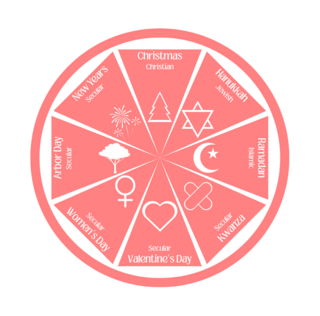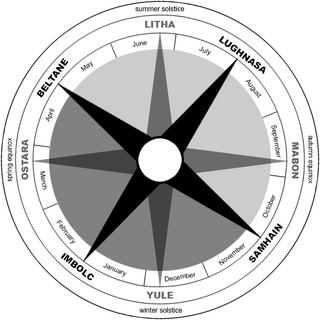The following is a list of public holidays in Armenia .
The following is a list of public holidays in Armenia .
Per Armenian law, 12 days are declared as non-working days. [1] [2] [3] [4] [5] Non-working days include:
| Date | English Name | Local Name | Remarks |
|---|---|---|---|
| 1-2 January | New Year's Day | Ամանոր | Tradition |
| 5-6 January | Christmas Day | Սուրբ Ծնունդ | Based on the calendar used in Armenian Apostolic Church |
| 28 January | Army Day | Բանակի օր | In celebration of Armenian Army formation on that day in 1992 |
| 8 March | Women's Day | Կանանց տոն | Women's Day |
| Date changes annually | Easter | Զատիկ | Easter |
| 24 April | Armenian Genocide Remembrance Day | Եղեռնի զոհերի հիշատակի օր | Remembrance of victims of Armenian Genocide in 1915 |
| 1 May | Labour Day | Աշխատանքի օր | International Workers' Day |
| 9 May | Victory and Peace Day | Հաղթանակի և Խաղաղության տոն | Shushi Liberation Day - on May 8, 1992, Armenian forces freed the city from Azerbaijani military forces, marking an important milestone in Artsakh liberation war for Armenians. Victory Day : 9 May (World War II) was a holiday throughout the USSR and is still an official holiday in Armenia. |
| 28 May | Republic Day | Հանրապետության օր | Establishment of the Democratic Republic of Armenia in 1918 |
| 5 July | Constitution Day | Սահմանադրության օր | Adopted in 1995 |
| 21 September | Independence Day | Անկախության օր | Independence from the Soviet Union in 1991 |
| 31 December | New Year's Eve | Ամանոր | |
The following days are mentioned in relevant laws, but are not specified as non-working days: [1]
| Date | English Descript | Local Name | Remarks |
|---|---|---|---|
| 21 February | Mother Language Day | Մայրենի լեզվի օր | Corresponding to International Mother Language Day |
| 8th Thursday before Easter | Saint Vardanian's Day - the day of good activities and national tribute | Սուրբ Վարդանանց տոն՝ բարի գործի և ազգային տուրքի օր | |
| 28 February | Day of remembrance for victims of massacres organized in Azerbaijan SSR and protection of rights of Armenian refugees | Ադրբեջանական ԽՍՀ-ում կազմակերպված ջարդերի զոհերի հիշատակի և բռնագաղթված հայ բնակչության իրավունքների պաշտպանության օր | |
| 7 April | Motherhood and Beauty Day | Մայրության և գեղեցկության տոն | |
| 16 April | Day of Armenian Cinema | Հայ կինոյի օր | |
| Last Saturday (or last Sunday if last Saturday is April 24) of April | Day of Citizen of Republic of Armenia | Հայաստանի Հանրապետության քաղաքացու օր | Introduced after 2018 Armenian revolution |
| 8 May | Defenders of the Country Day | Երկրապահի օր | Day of Yerkrapah veterans |
| 15 May | Family Day | Ընտանիքի օր | |
| 16 May | Students and Youth Day | Ուսանողների և երիտասարդների օր | |
| 1 June | Protection of Children's Rights Day | Երեխաների իրավունքների պաշտպանության օր | Corresponding to international Children's Day |
| 14 June | Day of Remembrance for the oppressed | Բռնադատվածների հիշատակի օր | |
| 64th day after Easter | Holiday of Saint Etchmiadzin | Սուրբ Էջմիածնի տոն | |
| 1 September | Knowledge and School Day | Գիտելիքի և դպրության օր | Knowledge and School Day marks start of school year |
| 12 September | Sparapet Day | Սպարապետի օր | Honors the memory of Mkhitar Sparapet |
| 5 October | Teachers' Day | Ուսուցչի օր | Corresponding to World Teachers' Day |
| Second Saturday of October | Translators' Day | Թարգմանչաց տոն | Remembering the Holy Translators |
| 10 November | Day of local self-governance | Տեղական ինքնակառավարման օր | |
| 7 December | Day of Remembrance for Earthquake Victims and Disaster Resistance | Երկրաշարժի զոհերի հիշատակի օր | Remembrance of victims of 1988 earthquake |
| 9 December | Day of condemning and preventing genocides | Ցեղասպանությունների դատապարտման և կանխարգելման օր |
Other traditional, international and professional holidays, as well as religious holidays, can also be celebrated in Armenia. National minorities can also celebrate their national holidays.
The Government of Armenia is allowed to swap working and non-working days. It usually makes use of this e.g. declaring Easter Monday non-working, while the next Saturday becomes a working day instead.
Every year, 14 weeks after Easter, Armenians celebrate Vardavar (Վարդավար), a lively festival where people soak each other with water using hoses, buckets, spray guns, and other tools. [6] Regardless of who you are or where you are, you will get wet if you are out and about during Vardavar.
The origins of Vardavar trace back to ancient Armenian pagan traditions. Historically, on this day known as Water Day, Armenians made offerings of red roses to Astłik, the goddess of water, beauty, love, and fertility. [7] The name "Vardavar" itself is a blend of the words "vard" (meaning "rose") and "var" (meaning "burn") in Armenian.
Despite its pagan roots, Vardavar has been seamlessly integrated into Christian Armenian culture. Following Armenia's conversion to Christianity in 301 AD, the explicit pagan elements were removed from the celebration. [8] However, the festival's essence, symbolized by the joyous and communal water splashing, remains a beloved tradition.
Armenian Earthquake Memorial Day is a day of remembrance in Armenia for the earthquake of magnitude 6.9 on the Richter scale [9] that struck in northwest Armenia (then part of the Soviet Union) on 7 December 1988. The earthquake damaged much of the country's infrastructure, especially in the cities of Spitak, Leninakan (now Gyumri), Kirovakan (now Vanadzor), and Stepanavan, [10] along with other small towns and villages near the epicenter.
Each year, 7 December is recognized by the government of Armenia (and the de facto government of Nagorno-Karabakh) as a day of remembrance of the tragedies that stemmed from the earthquake in 1988.
Motherhood and beauty day (Armenian : Մայրության և գեղեցկության օր) is an official holiday in Armenia dedicated to women. While March 8 celebrates all women, April 7 is mother's day. [11] [12] April 7 is the Feast of the Annunciation in the calendar of the Armenian Apostolic Church. It is expected to give presents to one's own mother. Celebrating each woman as beautiful in her own way, mothers are particularly happy to receive flowers.
April is the fourth month of the year in the Gregorian and Julian calendars. Its length is 30 days.

A holiday is a day or other period of time set aside for festivals or recreation. Public holidays are set by public authorities and vary by state or region. Religious holidays are set by religious organisations for their members and are often also observed as public holidays in religious majority countries. Some religious holidays, such as Christmas, have become secularised by part or all of those who observe them. In addition to secularisation, many holidays have become commercialised due to the growth of industry.

May is the fifth month of the year in the Julian and Gregorian calendars. Its length is 31 days.

May Day is a European festival of ancient origins marking the beginning of summer, usually celebrated on 1 May, around halfway between the Northern Hemisphere's Spring equinox and June solstice. Festivities may also be held the night before, known as May Eve. Traditions often include gathering wildflowers and green branches, weaving floral garlands, crowning a May Queen, and setting up a Maypole, May Tree or May Bush, around which people dance and sing. Bonfires are also a major part of the festival in some regions. Regional varieties and related traditions include Walpurgis Night in central and northern Europe, the Gaelic festival Beltane, the Welsh festival Calan Mai, and May devotions to the Blessed Virgin Mary. It has also been associated with the ancient Roman festival Floralia.

The Wheel of the Year is an annual cycle of seasonal festivals, observed by a range of modern pagans, marking the year's chief solar events and the midpoints between them. British neopagans crafted the Wheel of the Year in the mid-20th century, combining the four solar events marked by many European peoples, with the four seasonal festivals celebrated by Insular Celtic peoples. Different paths of modern Paganism may vary regarding the precise timing of each celebration, based on such distinctions as the lunar phase and geographic hemisphere.

Mother's Day is a celebration honoring the mother of the family or individual, as well as motherhood, maternal bonds, and the influence of mothers in society. It is celebrated on different days in many parts of the world, most commonly in March or May. It complements similar celebrations honoring family members, such as Father's Day, Siblings Day, and Grandparents' Day.

Victory Day is a holiday that commemorates the Soviet Union victory over Nazi Germany in 1945. It was first inaugurated in the 15 republics of the Soviet Union following the signing of the German Instrument of Surrender late in the evening on 8 May 1945. The Soviet government announced the victory early on 9 May after the signing ceremony in Berlin. Although the official inauguration occurred in 1945, the holiday became a non-labor day only in 1965.
Public holidays in Croatia are regulated by the Holidays, Memorial Days and Non-Working Days Act.
Holidays in Poland are regulated by the Non-working Days Act of 18 January 1951. The Act, as amended in 2010, currently defines thirteen public holidays.

There are several public holidays in Azerbaijan. Public holidays were regulated in the constitution of the Azerbaijan SSR for the first time on 19 May 1921. They are now regulated by the Constitution of Azerbaijan.

Vardavar or Vartavar is a festival in Armenia where people drench each other with water.
Astłik was the Armenian goddess of fertility and love, and consort of Vahagn. In the later pre-Christian period she became the goddess of love, maidenly beauty, and of water sources and springs.
Lists of holidays by various categorizations.
The following are 11 public holidays in Ukraine.

The Armenian Native Faith, also termed Armenian Neopaganism or Hetanism, is a modern Pagan new religious movement that harkens back to the historical, pre-Christian belief systems and ethnic religions of the Armenians. The followers of the movement call themselves "Hetans" or Arordi, meaning the "Children of Ari", also rendered as "Arordiners" in some scholarly publications.

The Independence Day of Armenia is the main state holiday in Armenia. This date is celebrated on September 21.
Navasard is the first month of the Armenian calendar. Navasard has 30 days, starting on 11 August and ending on 9 September. In ancient Armenia, the first day of Navasard was a holiday. In Armenian mythology, the Navasardian god was considered protector of the crops and the feeder of the hungry. His statue is currently standing in Bagavan, which today is considered a Pagan sanctuary.
Events of the year 2024 in Armenia.